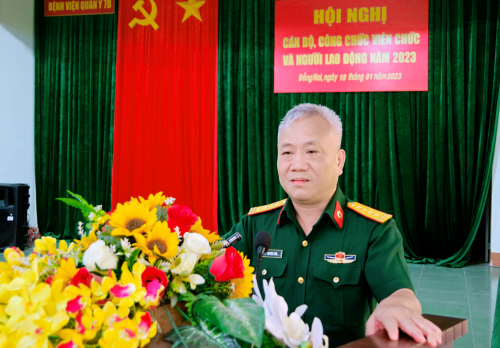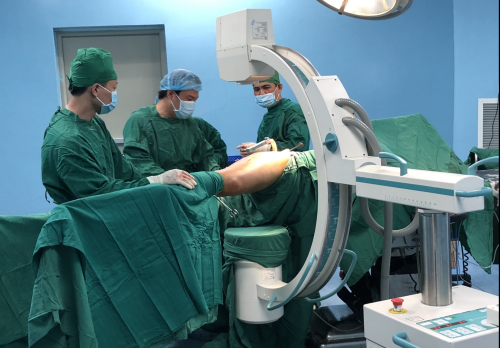Military Hospital 7B improves its capability comprehensively to meet the requirements of medical examination and treatment
Military Hospital 7B under the Logistics Department of Military Region 7 is tasked with receiving and treating patients as cadres and soldiers of the armed forces, persons under preferential treatment and health insurance policies, and citizens of Dong Nai province and adjacent localities, taking part in military medical support for Truong Sa Dong Island, Naval Region 2, and other units in its area; it is also the practical training centre for medical cadets from Logistics College No.2 and several medical – pharmaceutical schools. It is worth noting that since 2015, the Hospital has been tasked with deploying its doctors and nurses to United Nations Peacekeeping Operations in South Sudan. In addition to advantages of a military medical institution with its deep-rooted tradition, the Hospital has been faced with the increasingly demanding requirements of medical examination and treatment as well as the mechanism of financial autonomy. Meanwhile, there is a sharp increase in medicine and medical material price; the Hospital’s facilities and medical equipment have deteriorated; there is a lack of top physicians and nurses, thus negatively impacting on the Hospital’s task performance. Being fully aware of the Hospital’s pride, assigned tasks, and current difficulties, the Party Committee and Board of Directors of the Hospital have been focusing their leadership and direction on synchronously taking measures to comprehensively improve the Hospital’s capacity and meet the task requirements in the new situation.
 |
| Director of the Hospital addressing the personnel conference of 2023 |
Human resources play an important role in all fields; in the medical field, human resources play a decisive role in the quality of health care and protection as well as in the prestige and brand of a medical institution. For that reason, the Hospital has drastically implemented its strategy for building and developing a contingent of cadres and physicians to achieve a breakthrough in expertise. To that end, the Hospital has actively reviewed and proactively formulated plans on building and training a pool of cadres, physicians, nurses, and medical employees with sufficient quantity, “rich medical ethics and good medical expertise” at each position. Great value has been attached to building a contingent of top specialised physicians, technical cadres, and young cadres in internal medicine, surgery, resuscitation and emergency, and other military medical specialities as the basis for developing the Hospital into a 150-bed one. In addition to creating a favourable environment for physicians to promote their talent and creativity, the Hospital has attached importance to closely combining the planning and training of its personnel with the arrangement and use of its manpower in each department and board. It has diversified forms of training, taken on-the-spot training as the main solution, and required superiors and excellent and experienced cadres to train their subordinates, inexperienced cadres, and low-skilled employees. At the same time, it has actively invited top experts and physicians from higher-level large hospitals to deliver topics, transfer specialised techniques, and pass on their experience to its staff, while focusing on establishing basic surgical groups and out-of-hospital emergency teams. Besides, in order to keep pace with the development of modern medicine, the Hospital has actively selected and deployed its cadres to further specialised training courses at academies and universities both inside and outside the Military; at the same time, it has dispatched its physicians and nurses to do internship at higher-level large hospitals to broaden their knowledge and acquire advanced techniques, particularly in surgery. Up to now, over 80% of the Hospital’s cadres, physicians, and pharmacists have held bachelor’s degree or postgraduate degrees; 14 cadres have been given the title of “Excellent Doctor”. The Hospital has been capable of complex techniques in internal medicine and surgery, such as gastroscopy, brain tumour diagnosis, femur surgery, knee replacement, and knee ligament regeneration. Technical staff members have been capable of mastering new-generation equipment for medical imaging, medical test, and ultrasound imaging. As a result, on a yearly basis, the Hospital has always exceeded the target of basic treatment; the rate of sickbed use has always been over 50%. Doing so has laid a solid foundation for the Hospital to expand its scale of medical examination and treatment under health insurance and better meet citizens and troops’ demands and rights.
 |
| Performing a knee replacement operation |
In addition to on-the-spot military medical support, the Hospital has attached significance to improving the task performance of its working group for Truong Sa Dong Island and DK1 Platforms and its force in international mission. Under higher echelons’ decisions and guidance, the Hospital has directed its offices to develop professional training plans and build up willpower and determination among its physicians and nurses in the implementation of their tasks in difficult conditions at sea or on islands. Since 2020, the Hospital has deployed 3 Military Medical Teams (3 physicians and 9 nurses) to the Infirmary of Truong Sa Dong Island as well as 4 physicians and nurses to work at DK1 Platforms. All physicians and nurses taking part in those working teams have heightened a sense of responsibility and determination to successfully fulfil all assigned tasks. On Truong Sa Dong Island, military medical teams have provided first aid, examination, and treatment for 500 cadres, soldiers, and fishermen (12 emergencies and 98 surgeries) in a safe manner. From October 2022 to May 2023 only, physicians and nurses from the Hospital gave first aid and treatment to 104 patients (60 troops and 44 fishermen), while conducting 4 minor surgeries at DK1/16 and DK1/14. Doing so has positively contributed to firmly protecting national sovereignty over seas and islands. Besides, the Hospital has deployed 17 cadres and physicians to join the Military Region’s medical force in health care and protection for troops of units of the Ministry of National Defence and Military Region 7 right at grass-roots level. It is worth noting that the Hospital has selected, trained, and deployed 3 medical cadres to take part in United Nations peacekeeping operations in South Sudan, thus making contributions to well performing diplomatic work and spreading the image of “Physicians – Soldiers” of the Vietnam People’s Army.
During Covid-19 pandemic in Ho Chi Minh City and Southern provinces, the Hospital quickly adopted measures to improve its capacity for preventing and combating the pandemic as well as giving first aid and treatment to Covid-19 patients. Under higher echelons’ direction, it quickly mobilised forces, means, and medical equipment for the establishment of Field Hospital No.5 to receive and treat Covid-19 patients in Ho Chi Minh City and Dong Nai province, deployed forces for preserving and transporting Covid-19 vaccines, and organised mobile groups to give vaccination to troops of the Military Region and assist localities in the process. Thanks to grasping the task, building determination, and organising training courses on receiving and treating Covid-19 patients, particularly on pandemic prevention and combat, all forces of the Hospital successfully fulfilled their assigned tasks. After 3 months of service, Field Hospital No.5 provided first aid and treatment for over 2,500 patients without any death from Covid-19. Within the Hospital and Covid-19 vaccination and treatment zones, physicians and nurses strictly complied with regulations on pandemic prevention and combat, particularly hygiene, disinfection, distancing, screening, and monitoring of medication side effects, thereby opportunely dealing with bad situations, ensuring absolute safety, and avoiding cross infection. With its brilliant achievements, the Hospital was presented with Third-Class Labour Order by State President of Vietnam; it was also given Certificates of Merit by Prime Minister, the Ministry of National Defence, Military Region 7, Ho Chi Minh City, and Dong Nai province.
In order to meet the requirements of medical examination and treatment and financial autonomy under regulations, the Hospital has actively mobilised and focused resources on its facilities and medical equipment, stepped up scientific research, and promoted initiatives in diagnosis and treatment. Over the years, it has made use of budget allocated by higher echelons and financial support from localities, actively exploited social resources, and mobilised its own revenue to repair and construct its facilities, such as outpatient zone, waste management system, electricity system with a total investment of nearly 100 billion VND (it is now planning to build a 250-bed inpatient zone); it has spent over 20 billion VND on acquiring many pieces of modern medical equipment to improve its technical and technological foundation for medical examination and treatment. It has worked with other health institutions in the area to exploit specialised machines and equipment, thereby saving its resources and raising the quality of medical examination and treatment. Moreover, it has enhanced scientific research and promoted technical initiatives and innovations in its operations. It has focused on research and development and technical transfer. Since 2021, it has successfully carried out 17 research projects; typical examples include: “research into drug interactions from medical records at general internal medicine”, “effectiveness of epidural by levobupivacaine at 0.1%”, “research into the proof-based application of nursing practice”, which have been effectively applied into reality. During Covid-19 pandemic, the Hospital conducted the research project “making stabilised silver Nano to apply to disinfectant solution products” and developed the initiative “standardising the procedure for making hand disinfectant solutions under the World Health Organisation’s recommendations in field conditions”, which were opportunely applied to contribute to raising the effectiveness of pandemic prevention and control in the area. In addition to those above-mentioned measures, it has developed and applied a piece of software for medical examination and treatment. It strives to become a smart hospital by 2025 as a practical contribution to improving the quality of military medical support and well implementing the Government’s National Strategy for protection, care, and improvement of the people’s health towards 2030, with a vision towards 2045.
Sr. Col. NGUYEN TUAN
Director of the Hospital